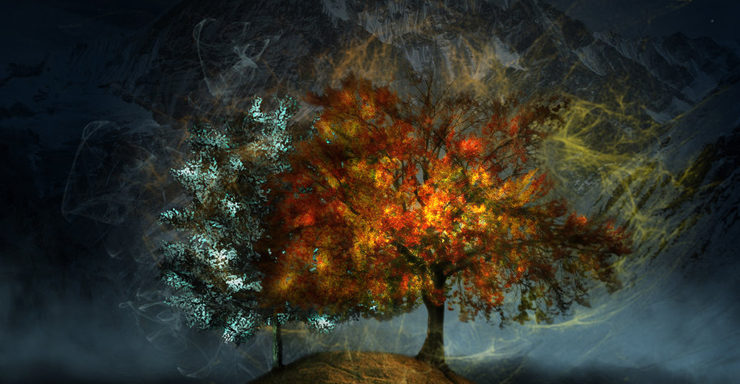In Which the Valar Throw a Party, Melkor Takes a Friend, Then Tells the Residents of Valinor Where They Can Stick It (Hint: It’s Where the Light Don’t Shine)
In “Of the Darkening of Valinor,” things are about to get real gloomy in the Blessed Realm. But since its residents don’t know it yet, why not throw a big party? There’s been too much tension in the air; this could be an opportunity to come together in peace and solidarity. Meanwhile, there’s an APB out for Melkor. He knows he can’t stick around, but before he skedaddles for good, he’s got one last trick for his old buddies. To pull it off, he recruits a particularly unsavory and many-legged ally. Remember old Shelob? In The Two Towers, we were told that she was “the last child of Ungoliant to trouble the unhappy world.” But who, exactly, is that?
Well, it’s time to meet Mommy Dearest…
Dramatis personæ of note:
- Manwë – King of the Valar, party planner
- Melkor – Ex-Vala, party crasher, total asshole
- Ungoliant – Eight-legged freak, avarice incarnate
- Fëanor – Noldo, firstborn prince, the “wronged” Elf
- Fingolfin – Noldo, secondborn prince, the bigger Elf
Of the Darkening of Valinor
When last we left the Lords of the West in their circle of thrones, they’d dispatched Oromë and Tulkas, the hunter and the bruiser of the Valar, in search of Melkor, who’d made a stink in the hills of Valinor before vanishing. Now Manwë is pretty sure he knows where the world’s worst parole breaker is headed. Melkor has proven himself unrepentant and is likely on his way back to his old stomping grounds over on Middle-earth—remember that place? You know, that continent across the Great Sea lit only by starlight, where Sauron and the Balrogs better not have rented out his room.
So Oromë and Tulkas head up to the frozen north of Aman, all the way up to that icy land-bridge that leads, perilously, to Middle-earth. In fact, it’s the only way to Middle-earth that doesn’t require a boat. Knowing Melkor hates the sea—not to mention Ulmo, the Vala who controls it—they figure this is the only way he could have gone. But ahh, Melkor didn’t leave; he’s not headed to Middle-earth just yet. He’s still got one or two more tricks up his sleeve.
He stealthily slips away far to the south of Valinor. And we’re explicitly told that, possessing Vala-level power, he can still “walk unclad” and unseen, traveling without any body at all like the spirit he is, “though that power he was soon to lose for ever.” It’s worth taking note of that line. To do the things he’s done and will continue to do to Arda and its creatures, it’s cost him huge reserves of his own great power. If Melkor had a mana bar, you’d be seeing a real dent it by now.
So he journeys to a forsaken and unexplored stretch of Aman, a part of the continent that the Valar never bothered to secure, between the mountain-fence of the Pelóri and the Great Sea. But he’s not just wandering around or buying time—he’s seeking out an old friend. Well, “friend.”
Someone we haven’t heard of before, but he sure has. Someone who, in the distant past, had called him Master, however briefly. A spirit of terrible power who had fallen into evil by Melkor’s own enticements but hadn’t stayed with him like his Balrog buddies had. Now it’s not clear when this took place—somewhere between the broad events of the Ainulindalë and the Arda-shaping in “Of the Beginning of Days” parts of the book, I guess. Seducing this particular spirit to his deviant ways might even have been part of the discord introduced by Melkor into the Music of the Ainur.
I’m talking, of course, about Ungoliant, who first “descended from the darkness that lies about Arda.” If she is a Maia, she’s of the variety as mighty as one of the Valar or nearly so, considering what she accomplishes. Who knows what sort of being she might have been at the start of the Music? Maybe one with a proclivity for the arts of weaving, transmutation, or, I guess, gastronomy? But what she is now is something…else. Something vile and gluttonous. And hers is an evil quite apart from Melkor’s, something almost purer. Where Melkor is a being of pride and tyranny who wants to order all things and dominate everyone, Ungoliant just wants to consume it, to take it into herself. Where Melkor would control light, Ungoliant would devour it.
The shape she has taken is that of a huge and loathsome black spider. Notice she isn’t a spider, but like to one. There’s no reason to think that spiders—regular spiders—are anything more than creatures of the natural world in Tolkien’s legendarium. Orb weavers, brown recluses, and black widows, for example, are all probably just critters of Yavanna’s devising.
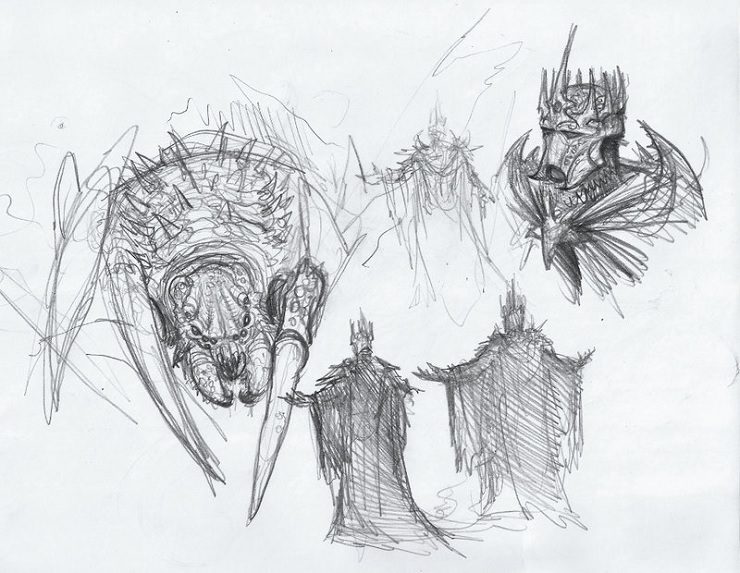
But Ungoliant has assumed a blasphemous version of something natural and—if you’re inclined to think so—even beautiful. Which is to say, it is the elegant and deadly perfection of the terrestrial spider that she’s assimilated in perverse and stomach-turning levels. At some point in the future, she will give birth to broods of murderous large spiders—only the last of which will be Shelob (and she in turn will spawn those Mirkwood jerks). But up until this point, she’s just been lurking in a cleft in the mountains of southern Aman amidst her black webs:
There she sucked up all light that she could find, and spun it forth again in dark nets of strangling gloom, until no light more could come to her abode; and she was famished.
So Ungoliant drinks in light and transforms it into her clinging webs. It’s the ultimate corruption. She takes something marvelous, with many beneficial uses (light) and then mutates it into something ugly with only one purpose—to ensnare and despoil. This is not so different from Melkor’s own works, for he made Orcs out of Elves, and the former are beast-like humanoids whose only function is to destroy.
But I digress. With Melkor deciding to pay his old acquaintance a visit—I can’t help but wonder at their untold history together—he knows he needs a form to fit both his needs and the venue: Ungoliant’s creepy abode. So he dusts off the shape he wore back in the days before his imprisonment, when he was the dreaded Lord of Utumno. We’re talking about a deliberately scary-ass body, probably a smaller (but still quite large) version of the “clad in ice and crowned with smoke and fire” version of himself described at the end of the Ainulindalë. A guise meant to intimidate and exude power.
But, whether he knows it yet at this point or not, Tolkien gives us a heads-up that “in that form he remained ever after.” Remember earlier, that ability to go all ghosty and unclad Melkor was “soon to lose for ever.” This is that moment. He’s expended so much of his Ilúvatar-granted power that some of his overarching godlike abilities are now beyond him. Oh, he’s still got a shitload of power, but messing with Arda and hiding from his old associates is costing him.
Melkor tells Ungoliant his plan and tries to win her over. She is wisely hesitant. After all, she’s got a good thing going here in these forgotten holes. She’s rightfully wary of the Valar, who don’t know about (or at least never come looking for) her. But to go to Valinor, where all fourteen of them are bunched up? Melkor’s daring proposal would have her risk everything. But it is slim pickings down here in her dark corner—hardly any light to be found and supped upon. And she is hungry. All the time, so very hungry.
So he sweetens the pot:
Therefore Melkor said to her: ‘Do as I bid; and if thou hunger still when all is done, then I will give thee whatsoever thy lust may demand. Yea, with both hands.’
In his dark heart, he’s crossing his fingers. He’s even laughing. This asshole is a liar gutsy enough to try and use a being as terrifying as Ungoliant. He couldn’t care less about her needs. But his promise works. Her lust for great light to feed upon overrules all else. She agrees.
So off they go. Ungoliant uses her superpower and spins forth a great “Unlight,” a veil of shadows which hides them as they head north towards Valinor. My assumption is that with him in his Dark Lord shape and Ungoliant just being her usual detestable self (she never changes form and probably never can), that busybody Manwë would otherwise be able to see them coming a thousand miles away. Remember, Melkor only made it down this far, all the way to Ungoliant’s dark realm, because he’d journeyed here alone and “unclad.”
But together they scuttle, climb, and run atop the mountains and finally reach a great outcropping. There, Melkor strikes a villainous pose and laughs triumphantly. They both look down into the fertile, blessed, and so-called Guarded Realm of Valinor. Why, over there are the woods where Oromë hunts! And over this way are the lush pastures of Yavanna! I’m guessing there’d also be an obstacle course and track field where Tulkas and Nessa race and work out.
And beyond it all, the radiant sight of the Two Trees on their great, green hill. Ungoliant had probably never seen such a feast since…well, maybe ever. Who knows where she was during the days of the Lamps? But where the Lamps were colossal constructs stood up on mountains, the Trees are much smaller. Their light is holier but much softer; lovely living things whose life and light are just screaming to be leached. She’s game for this.
Down they go.
Meanwhile, a festival is going on in Valinor on and around the mountain of Taniquetil. Melkor knows this. He was counting on it.
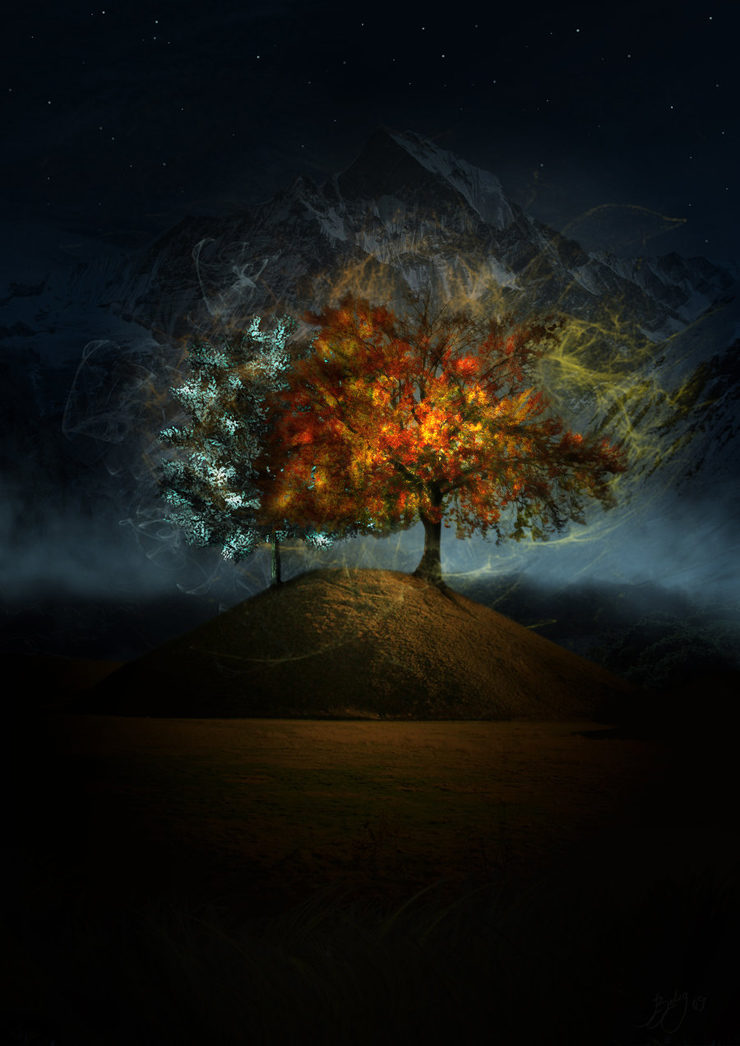
It’s the party of the century—or maybe age? Yavanna has raided her pantries and brought out all the best stuff; her fruits and veggies are at their ripest. And I’m thinking Oromë’s probably brought in all the roast beast for the meat-eaters among the gathering revelers. Of course, Tolkien never gives us the really fun details. Like, did Varda string up all the lights and decorations? Were Tulkas and Nessa part of the entertainment? Did Vairë the Weaver make tablecloths, with Aulë forging elaborate centerpieces? Did Vána make flattering party hats? Did Ulmo whip up some fountains? Who had to sit next to Mandos and avoid making eye contact with him?
Sure, it’s easy to joke that every time the Valar throw a party, catastrophe occurs. Fair, when you consider the Lamps debacle. But I think it’s safe to assume that the three ages that Melkor was imprisoned, and plenty before it, saw all kinds of celebrations and festivals with zero evil interference. Then again, this one does seem to be a grander blowout than any before it, especially because of the Eldar.
I’m guessing feasting wasn’t nearly as fun until the Elves came along. Sure, the Valar and Maiar can eat if they want, but they don’t need to. Yet Elves are the perfect revelers. Anyone who’s ever read The Hobbit or The Lord of the Rings, or hell, a bunch of old faerie stories, knows that Elves love festivals and lights and partying and dallying. I mean, when the Fellowship is all packed and ready to leave Lothlórien in Book Two of LotR, the Elves keep making them stop and feast again. It’s hilarious. You can’t rush anything with Elves, not even when there’s an epic quest to carry out.
Now what doubly hurts about this Festival to End All Festivals is that it’s specifically aimed at healing “the evil that had arisen among the Noldor.” The Valar know that with Melkor still on the run, he’ll be up to his old tricks soon enough. Dark tidings are sure to come again. So in the meantime there is this hope of coming together, of establishing solidarity. Feasting and celebrating and dancing might go a long way at chilling everyone out. Who knows? This could work!
In attendance are both the Noldor and the kindred of Elves called the Vanyar. The Vanyar had no part in that earlier unrest, of course, but they’re like cousins to the angsty Noldor. They’re happy to help out, plus they’re always on board with whatever Manwë wants to do. He’s the best. Noticeably not in attendance are the sea-loving Teleri, and not because they’ve got problems with anyone. And not because they weren’t invited—of course they were—but because they’d just rather hang out by the surf than go to some fancy party. They’re content right where they are and don’t want to bother with the politics of Valinor. They’re the ultimate beach bums of the legendarium. Which is fine; no one’s required to come to this shindig. Hang loose, Teleri.
Anyone, no one’s required to come to this party except for Fëanor. Manwë does command him to come, because he was a key player in that whole unrest-and-threat-making fiasco. This is his opportunity to demonstrate good behavior. It’s not breaking his exile because he was only forbidden from returning to the Noldorin city of Tirion. But this is up on the green slopes of Taniquetil itself, in and around the halls of Manwë and Varda. Fëanor indeed comes, but without his sons and without his dad. Finwë, in fact, is sitting at home in Formenos with his arms crossed, basically saying, “Until my son is pardoned—you know, from threatening to kill one of my other sons—then I’m not going anywhere. And I’m not anyone’s king, either.” This is Finwë’s most disappointing hour. Certainly his least kingly.
Fëanor, nose high in the air, is deliberately not decked out in the gems and ornaments that the Noldor are known for. Most importantly, he doesn’t bring the Silmarils. Oh, it’s definitely against his instincts not to keep those three über-gems close, but he’d rather leave them behind in the vault than let anyone else see and enjoy them. So there! Take that, you Valar and Eldar! Fëanor, armed only with his unswallowable pride, chooses to play the victim. He was wronged. Moreover, he is always in the right, and this certainly seems to be his stance going forward. That punk.
But Fingolfin, the stalwart half-brother that Fëanor had threatened, wants peace between them. He’s down with what Manwë is trying to do, to heal the hurts. Fingolfin is a legit nice guy. He tells Fëanor that he holds no grudge, and has no intention of taking Fëanor’s place as heir (which is where this all started, at least in Fëanor’s head):
‘Half-brother in blood, full brother in heart will I be. Thou shalt lead and I will follow. May no new grief divide us.’
‘I hear thee,’ said Fëanor. ‘So be it.’
Ouch. The fact that Fingolfin isn’t bowing down and begging him for forgiveness—y’know, for having placed Fëanor in the uncomfortable position of having to threaten his brother just to set him straight—clearly irks the great Fëanor. Fingolfin just trying to clear the air isn’t good enough, but it’ll have to do for now.
And just as they’re gathered there before Manwë, at that primetime hour when the lights of both Trees are mingling together down below, that’s when Melkor and his lovely partner show up to crash the party. Well, not to Taniquetil where all the security is gathered! That would be crazy. Right, right to the green mound where the Trees stand.
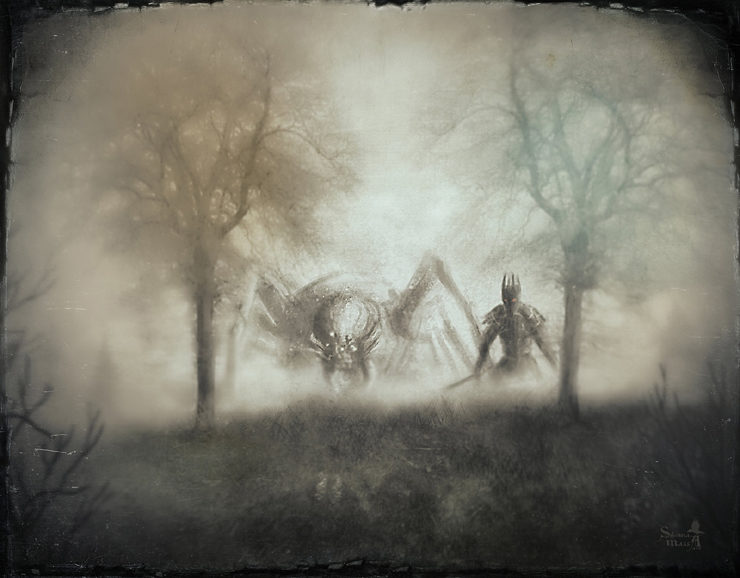
Why there is no guard set there on that hill is a question we can only shake our heads at. In a very early draft of this story in The Book of Lost Tales, there is an Elf who spies the intruders and comes running with a blade. Though he manages to surprise and knock Ungoliant off her feet—because Elves in this age are no joke—he’s then run through straightaway by Melkor. So really, in the published Silmarillion, even if there was a proper guard by the Trees, it’d have to have been the likes of Tulkas to really stop Melkor.
Now, it’s easy to dismiss the Valar as foolish. Certainly they’ve make mistakes across the ages, but try not to see this failing through the lens of our own real world history. Arda’s history, up until this point, is another thing. Melkor’s evil has certainly revealed itself before, but it’s not exactly common—not even for the Valar, who have dwelt now in peace and safety for untold ages. And the Eldar? They’ve never seen this sort of sabotage before. The Lamps were before their time. To everyone here, this kind of treachery, especially in a place as paradisiacal and secure as Valinor, is…well…inconceivable.
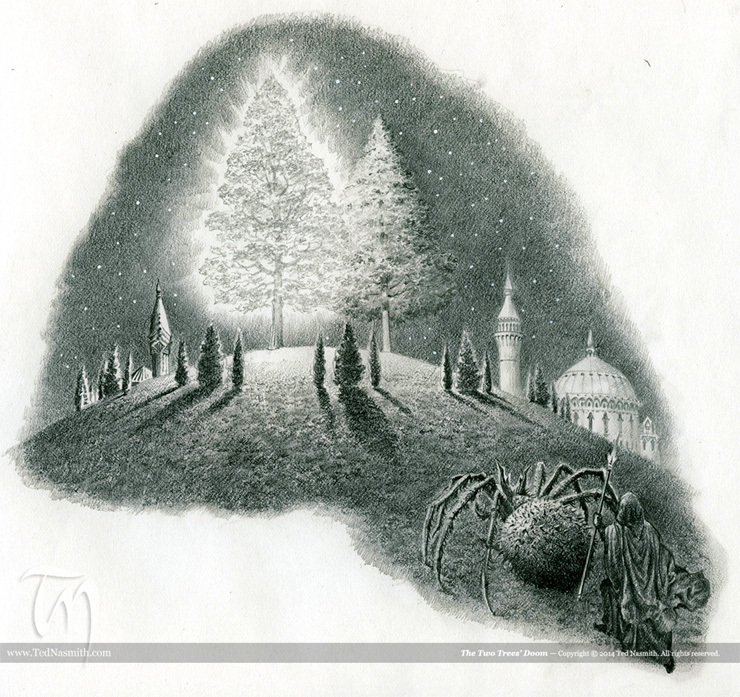
What follows in the book is one of the most vivid, beautiful, and yet horrific passages in literature. I won’t reproduce any of it here; it’s worth going right to the source. Go and read it, or reread it, and remember that these are the words of an author who loves hobbits and afternoon tea and waistcoats. But Tolkien can get dark—real dark—and give you the heebie-jeebies when he knows it’s the right moment.
Once they’re at the base of the mound, Ungoliant spins her Unlight and obscures their presence. Then Melkor jumps up before the Two Trees, golden Laurelin and silvery Telperion. He’s got a black spear we’ve never heard about before—whether he wrought this himself or just fashioned it from his own being, it doesn’t even matter. It’s as sharp as his malice, and he uses it to stab each trunk, wounding them deeply and spilling out their blood-like sap. In that Book of Lost Tales version I mentioned, the radiant spray of sap starts to overwhelm and “consume” Melkor and he’s saved from it only by Ungoliant, who rushes in and does her thing.
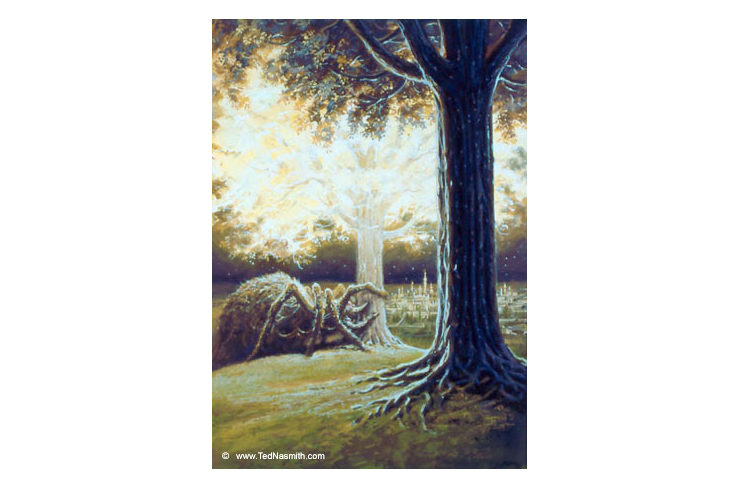
She drinks. And drinks. With her “black beak”—ugh, so gross—set right up to the spurting wounds, she sucks up the liquid light from each Tree even as her own deathly toxins go back into them, all the way to every root and leaf and fiber. They wither, they die. The Trees are slain.
Even when she’s done with them, Ungoliant’s not sated. She goes right over to those vats where Varda had gathered and pooled the glowing liquid that fell from the Trees like dew. She drinks those dry, too. Every last drop.
The Trees are done. Done. This is a huge turning point in Arda, a thick black line drawn across the span of time. This is not only because of the beauty and power of the Trees of Valinor but also because they have been the only significant light source in this region of the world. Sure, the Lamps of the Valar were brighter and shone more expansively, but the Earth was younger then. And there were no Elves. Now…well, this is the only great light the younger generations have ever known, like a sun and moon to them. And so splendorous and vital were the Trees that, if you remember, the most lasting classification of Elves is defined by their presence.
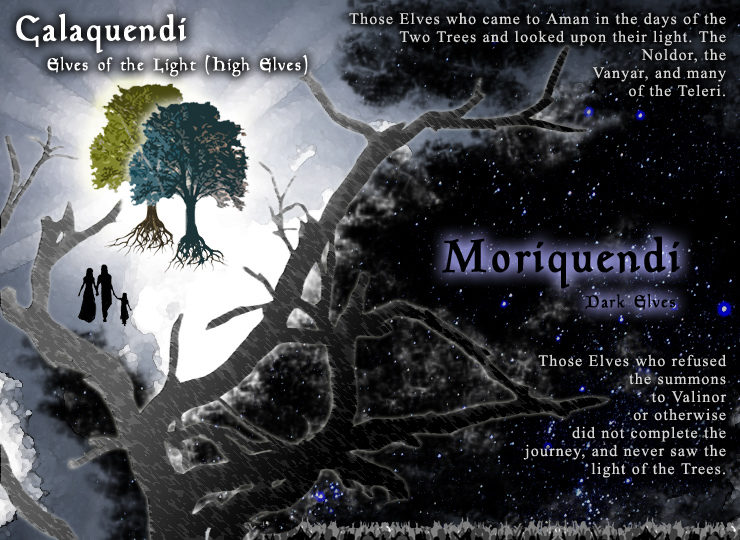
Even with the Trees dead, Elves like Galadriel and her brothers will always be Calaquendi and benefit from having seen them. Theirs is the wisdom and grace of the High Elves who dwelt, at least for a time, in the Bliss of Valinor. Whereas later Elves, even the noble and especially knowledgeable ones like Elrond who will one day sail into the West and come to Valinor, will find it Treeless. They are forever Moriquendi.
I can’t help but think that among the High Elves present that day, there’ll always be the question: Where were you when the Two Trees died? Again, it’s a sorrowful turning point.
Back to Ungoliant. She’s a living factory of mindblowing repugnance. Even as she drinks up Varda’s wells, she spews out clouds of foul vapor and then swells up “to a shape so vast and hideous that even Melkor was afraid.” Which—again, so gross. She may be in the form of a not-so-itsy-bitsy spider, but she can balloon out like a big fat tick, too. Remember the disgusting description of Shelob when she’s trying to squish Samwise with her sheer bulk of “putrid light” and her stench alone nearly does him in? Well, this is Shelob’s mama. Ungoliant seems like the forerunner of all that’s distended and swollen and jacked up.
So Ungoliant is belching some seriously bad gas and growing huge, gratified to be drinking and ruining so much light. But she’s never exactly a happy camper. She’s never satisfied. And Melkor is kind of wondering what the hell he’s done. This Ungoliant is a bit more than he bargained for; this may not go as smoothly as he’d hoped. He knows he helped make her what she and yet he’ll never have a leash on this insatiable monstrosity.
Now we have come to the Darkening of Valinor, which was foreshadowed and “spoiled” for us a few times already. Everywhere the light of the Trees had reached is engulfed in gloom. Sure, individual households might have their candles and lanterns—maybe even some glowy gems in the fashion of Fëanor’s inventions—but it’s never been this dark, not since before the the Trees. Moreover…
the Darkness that followed was more than loss of light. In that hour was made a Darkness that seemed not lack but a thing with being of its own: for it was indeed made by malice out of Light, and it had power to pierce the eye, and to enter heart and mind, and strangle the very will.
Despair and grief is introduced to Valinor such as the Eldar have never known. Complete silence—the silence of horror—overtakes the realm. The only thing anyone can hear at Taniquetil—where moments before there was laughter and song—is the distant wailing of the Teleri over by the shores “like the cold cry of gulls.” They know the least about what’s going on.
And somewhere on a cold hilltop, some poor Maia—some dark-robed goth in service to Mandos—probably sets the Days Since Cataclysmic Disaster In Arda board back to zero.
Now I am left wondering about Nienna. She is the Vala of mourning; she’s wept for Arda ever since Melkor first marred it, and she wept when the Two Trees were first seeded. It was her tears that enriched the soil that cradled them. But it was also Nienna who spoke on Melkor’s behalf and asked for pardon when he was tried. She was the only one who did. Does she now see what mercy has produced, or had she guessed it all along? Was evil like his a requirement for suffering, an inevitability that needed to happen in Arda Marred?
And I can barely imagine the heartbreak of Yavanna. Laurelin and Telperion were her best work; I am reminded of Treebeard’s words:
Some of those trees were my friends, creatures I had known from nut and acorn; many had voices of their own that are lost for ever.
The individual reactions of the Valar are some of what I crave the most, honestly. But Tolkien doesn’t indulge us. And maybe it’s just greed on my part as a reader of contemporary fantasy. This isn’t YA, where every word, thought, and emotion might be explored in depth—but on the other hand, Tolkien’s method leaves so much room to imagine. And I enjoy that, too.
The only thing that follows the initial shock and horror is anger: outrage on the part of those who always knew Melkor would pull some shit. Oromë leaps onto his steed and the fire of his hooves are the “first light that returned to Valinor.” And Tulkas goes running in pursuit of his old foe—maybe some small part of him is stoked that Melkor has popped up again? I just know he’d been doodling sketches of this very moment, fantasizing about different ways to rearrange Melkor’s face. But Oromë and his riders (presumably some Maiar cavalry) are “blinded and dismayed” by Ungoliant’s obscuring cloud of disgusting awfulness. And Tulkas is likewise ensnared like a raging barbarian caught in a net, unable to land a blow against anything in the gloom.
By the time the clouds of Unlight start to disperse and the Valar reach the scene of the crime, it’s no use. Melkor and his friendly neighborhood Spider-pal are gone, and “his vengeance was achieved.”
Now, if everyone had just been reasonable from the start and let him have the Imperishable Flame all for himself, and let him command the wills of every living and spiritual thing in all of existence for ever and ever, none of this would have ever happened. Lesson learned yet?
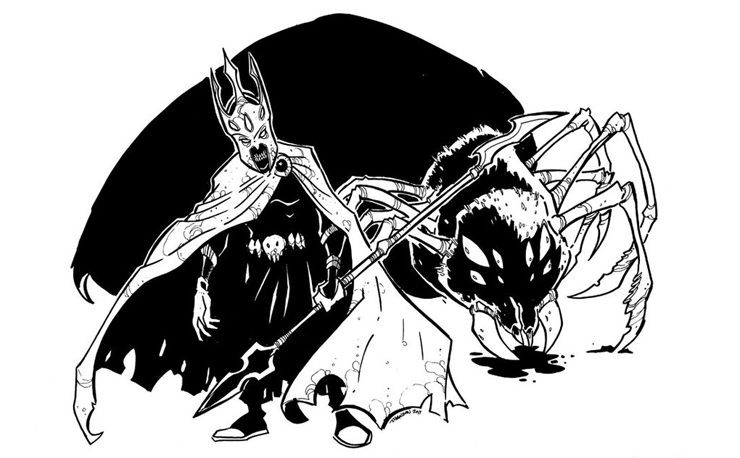
In the next installment, we’ll navigate the troublesome politics of post-Tree Valinor, see reaction videos of unsettled Elves, and listen to the notorious affidavits of Fëanor as we dive into the chapter “Of the Flight of the Noldor.”
Top image: “Laurelin and Telperion” by Belegilgalad
Jeff LaSala empathizes with Tolkien’s aversion to spiders. Tolkien nerdom aside, he wrote a Scribe Award–nominated D&D novel, produced some cyberpunk stories, and now works for Tor Books.










